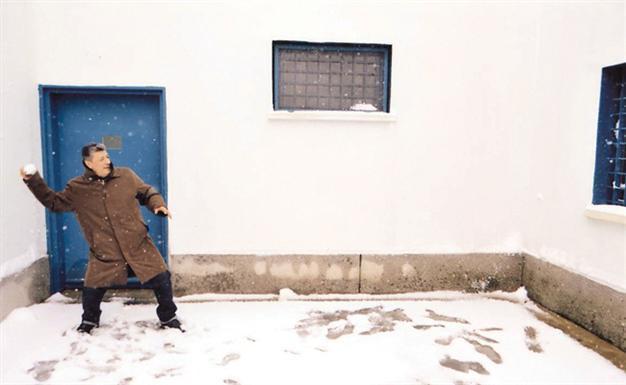Mustafa Balbay has a story to tell

Hürriyet photo
When he was taken into custody on March 5, 2009, he was the Ankara bureau chief and political columnist for the newspaper Cumhuriyet.
Yesterday, Mustafa Balbay completed his third year in jail.
Balbay has spent the last of those three years in a sort of solitary confinement, alone in a jail cell. The picture accompanying this column, originally published in Hürriyet’s Sunday edition together with an interview through his lawyer, was taken by Balbay himself and shows him throwing a snowball against the wall of his jailroom during a fresh air break.
Despite his three years in jail, Balbay has not been convicted of any crime yet; he is still “under arrest.” He is an example of the problem of long arrest periods, a major drawback of the Turkish justice system.
Last Saturday, March 3, on same the day that two rallies were held in Istanbul to protest the continuing incarceration of a group of journalists (Ahmet Şık and Nedim Şener, two well- known journalists, had completed a year in jail), the Silivri Prison Authority decided to transfer Balbay and another journalist, Tuncay Özkan, to double cells. For the last two days, Balbay has been living together with another journalist, Coşkun Musluk (of the web site ‘Oda TV’).
If you ask members of the Turkish government, like Stephen Sackur asked
Turkey’s European Union Affairs Minister Egemen Bağış last week, the answer is the same as Prime Minister Recep Tayyip Erdoğan’s: There are no journalists inside; the fact that they carry press identity cards doesn’t change the fact that they are accused of terrorism, rape and bank robbery.
Well, there is a little bit of truth in that. It is true that there is one person accused of rape and one accused in a bank robbery, both of whom happened to work for the press at one stage of their lives. It is something else to generalize their situations to the nearly 100 journalists and writers currently in jail, according to the Platform of Solidarity with the Arrested Journalists, which organized the rallies in protest of arrests.
The accusations of terrorism against journalists were made in the framework of the ongoing trials known as Ergenekon and Sledgehammer. Prosecutors accuse the suspects of being members of illegal organizations established to conspire against the ruling Justice and Development Party (AK Party) government, with the aim of overthrowing it.
Turkey’s main opposition Republican People’s Party’s (CHP) leader Kemal Kılıçdaroğlu believes that many of those accusations are baseless, and have been made only to deter any opposition to the government in society. That is why he got two inmates elected to Parliament in the 2011 elections, one being Balbay and other being one of Turkey’s most brilliant organ transplant surgeons, Professor Dr Mehmet Haberal; they are both members of Parliament in jail now.
We can not say before the end of the trials whether the accusations made by prosecutors can be proven in court, or whether those tried will be convicted. But what we can say is that many, from President Abdullah Gül to Parliamentary Speaker Cemil Çiçek to Haşim Kılıç, the head of the Constitutional Court, have criticized long detention periods. Justice Minister Sadullah Ergin himself has promised a number of times that the issue is being worked on, but there is no sign of the law being amended yet.
With or without an amendment to shorten arrest periods and speed up trial procedures, members of the government should realize that their “No journalists in jail” line is not a convincing one.
journalism, jailed, press freedom, akp, erdogan,
